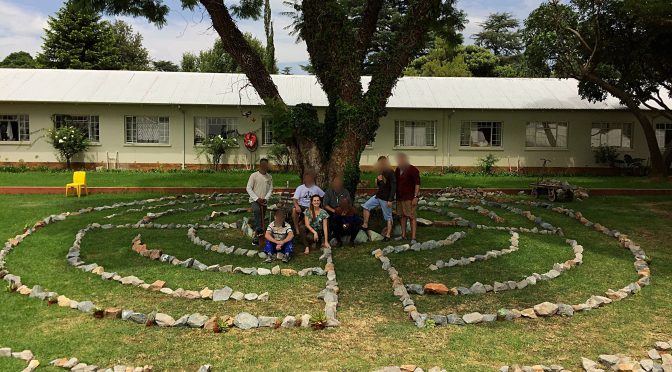Wedge Gardens treatment centre’s occupational therapy (OT) department has stepped to it and completed is walking labyrinth.
“The aim was to provide an additional space for mindfulness practices at the Wedge Gardens to fuel and support the dialectical behaviour therapy (DBT) and mindfulness-based stress-reduction programmes that the OT department run every weekday morning,” says Kendra Neethling, who heads up the department.
Mindfulness and emotion regulation, which are skills of DBT, have been recognised as key components towards any recovery process. Fuelled by the desire to motivate and engage the patients at Wedge Gardens in mindfulness, Kendra began the process of collecting donations for the rocks needed to form the borders of the walking labyrinth.
“A huge thank you to Pebbles for Africa for their help in reducing the costs of two truckloads of rocks. Gratitude is also extended to all individuals (whose names are recorded around the labyrinth) for their contribution towards raising funds for the OT project, as well as to Rand Aid for its continued support.”
Kendra says the construction of the labyrinth was a rewarding process for all involved. “The patients were taught to take initiative during the construction process and as such were encouraged to work collaboratively – utilising communication and problem-solving skills, as well as frustration tolerance, in the formation of ideas and the implementation of action.
“The pride I have in my patients is huge. Not only have they shown investment in their recovery process by actively engaging in all elements of this project, but they have created a space that can be used for years to come by future recovering addicts and alcoholics. Mindfulness is an exceptionally powerful medium in developing skills that combat anxiety, depression and rumination as well as emotion regulation, self-compassion and awareness.”
Occupational therapists work through activities to help with awareness of self, skill development and the creation of functional, meaningful and goal-directed lives. Every project initiated by the OT department at Wedge Gardens is centred around optimal patient care and treatment.
“It is a fantastic experience seeing the change that occurs in an individual when they engage in something that stimulates passion, creativity and enthusiasm – and even more so when it promotes change in behaviour.”
* Wedge Gardens can be reached at 011 430 0320. You can also ‘like’ Wedge Gardens on Facebook (www.facebook.com/WedgeGardensTreatmentCentre) or follow them on Twitter (@WedgeGardens)
